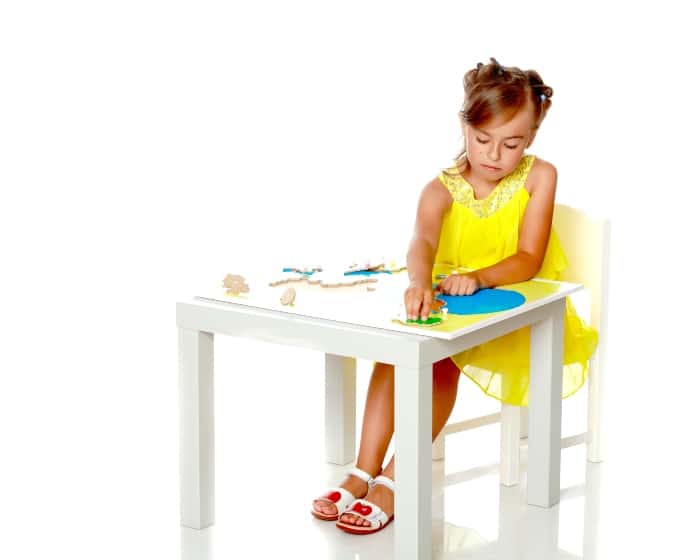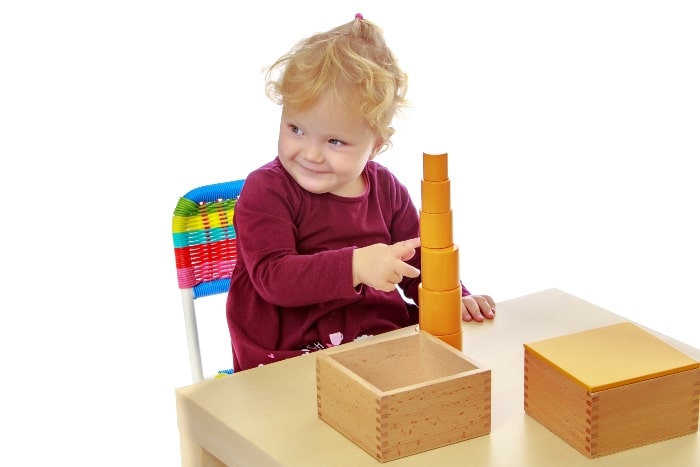What are the benefits of Montessori education for kids? Montessori education is an educational approach developed by Dr. Maria Montessori in the early 20th century. It is based on the idea that children learn best when they are actively engaged in their education and have the freedom to explore and discover at their own pace. There are several benefits associated with the Montessori method:

Individualized Learning
This method of learning recognizes that each child is unique and progresses at their own pace. The curriculum is tailored to the individual needs and interests of each child, allowing them to explore subjects they are passionate about and work on areas where they need more support.
Hands-On Learning
Many of the Montessori classrooms are filled with hands-on, self-correcting materials that promote experiential learning. These materials help children develop concrete skills in subjects such as math, language, and science.
Independence and Responsibility
Nevertheless, the Montessori method encourages independence and self-discipline. Children are given the freedom to choose their activities, set their own goals, and manage their time, which helps them develop responsibility and a strong sense of self.
Mixed-Age Classrooms
Of course, most Montessori classrooms, especially with younger kids that are in pre-k or kindergarten, often have mixed-age groups, which promotes peer teaching and learning. Younger children learn from older peers, while older children reinforce their knowledge by teaching younger students.
Child-Centered Environment
In Montessori classrooms, the environment is carefully prepared to meet the developmental needs and interests of the children. Materials are organized and accessible, and the layout of the classroom encourages exploration and movement. This child-centered approach allows children to follow their natural curiosity and interests, leading to deeper engagement and learning.
Emphasis on Respect and Community
For instance, Montessori environments promote a sense of respect for oneself, others, and the environment. Children learn to respect the rights and feelings of others, resolve conflicts peacefully, and contribute positively to their community.
Focus on Practical Life Skills
The curriculum includes practical life skills such as cooking, cleaning, and self-care. These skills help children develop independence and a sense of competence in their daily lives.
Holistic Development
This type of education aims to foster the development of the whole child, including cognitive, social, emotional, and physical aspects. It values creativity, critical thinking, and problem-solving as well as academic achievement.

Emphasis on Peace and Conflict Resolution
Montessori classrooms often emphasize peace education and conflict resolution, helping children develop strong social and emotional skills and promoting a sense of community.
Promotion of Creativity and Critical Thinking
We like the Montessori education because it encourages children to think creatively and critically. Through open-ended materials and activities, children are encouraged to explore, experiment, and find their own solutions to problems. This fosters creativity, innovation, and the ability to think independently.
Respect for Nature and Sustainability
Montessori instills a deep respect for nature and the environment. Children are encouraged to engage with nature through activities like gardening, outdoor exploration, and caring for animals. This fosters a sense of stewardship and responsibility towards the natural world, promoting environmental awareness and sustainability.
Preparation for Real-World Challenges
It helps prepare children for the real world by providing them with practical skills, social-emotional competencies, and a strong sense of self. By fostering independence, resilience, and adaptability, Montessori graduates are well-equipped to navigate life’s challenges and pursue their goals with confidence.
Prepared Environment
All Montessori classrooms are carefully designed to be inviting and purposefully arranged to promote exploration and discovery. Materials are accessible to the children, making it easy for them to engage in self-directed learning.
Love of Learning
The greatest benefit of a Montessori education is that it is designed to instill a lifelong love of learning. By allowing children to explore their interests and learn at their own pace, it encourages a natural curiosity and a deep enthusiasm for education.
Cultivation of Global Citizenship:
A Montessori education promotes a sense of global citizenship and cultural awareness. Through exposure to diverse cultures, languages, and perspectives, children develop empathy, tolerance, and respect for cultural differences. This prepares them to thrive in an increasingly interconnected and multicultural world.
Parent Involvement and Community Engagement
In fact, it values the partnership between educators, parents, and the broader community. Parents are encouraged to be actively involved in their child’s education, and Montessori schools often foster strong partnerships with local organizations and community members. This collaborative approach creates a supportive learning environment that benefits children both inside and outside the classroom.
In conclusion, it’s important to note that while Montessori education offers many benefits, it may not be the best fit for every child or family. The success of a Montessori education largely depends on the quality of the program and the compatibility with a child’s learning style and the family’s values and goals for education. Again, these are just some of the benefits of Montessori education for kids.








So many awesome benefits. I think the preschool my kids went to had some montessori education. Not all, but some.
This seems like a great way to school kids. I should have looked into this with my kids.
Our child’s preschool did this kind of style and it works so well! There are definitely so many benefits to it.
I think this is great for kids as well. Our schools actually have Montessori for kids, and many of the kids love it.
I’ve seen some really positive things come out of montessori education. I’m definitely a fan.
I can also attest to the many benefits of the Montessori method for kids. My granddaughter’s school uses the Montessori approach, and it has significantly helped many children in their learning.
Wow, such amazing benefits! Love how it focuses on individual learning and practical life skills 👌🏻❤️.
It sounds like Montessori is full of great ways to engage with the children and make learning fun!